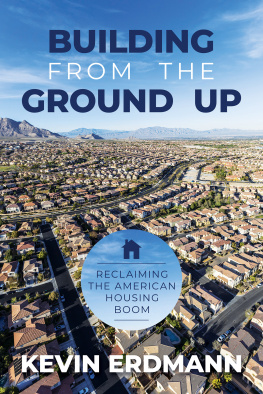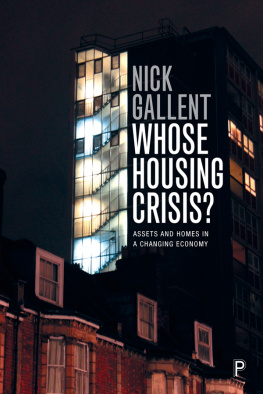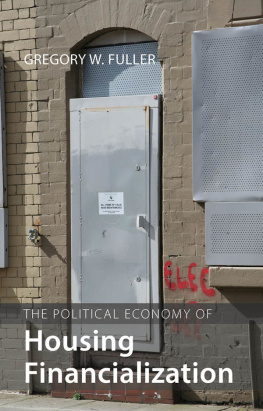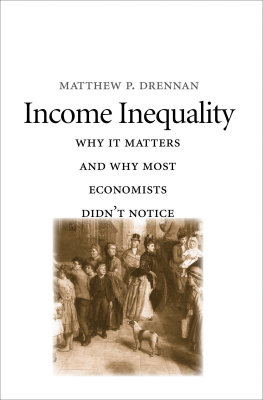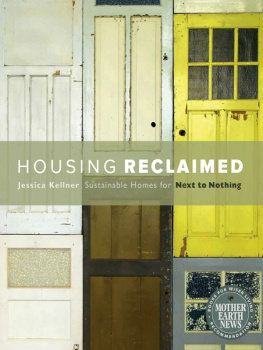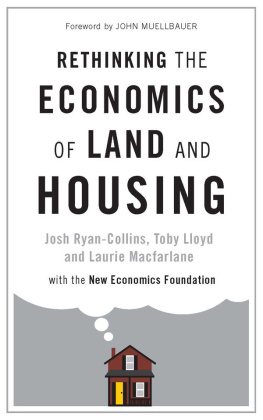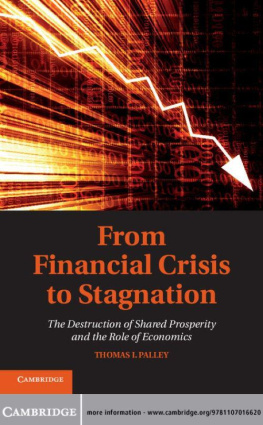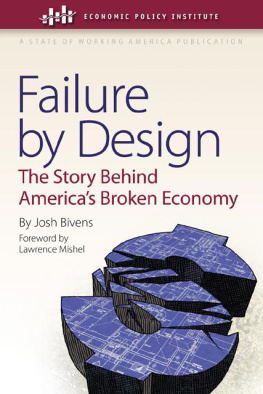Advance Praise for Building from the Ground Up
A lot of what we think we know about the housing crash and the great recession is wrong. In Building from the Ground Up , Kevin Erdmann patiently helps us unlearn false lessons that are still doing our economy serious damage.
Ramesh Ponnuru, Senior Editor, Natio nal Review
Erdmann is a rare combination of charming and disagreeable, which makes him a perfect challenger for poorly-supported conventional wisdom. In these pages he tells the untold story of the 2008 financial crisishow the homebuilding industry took the fall for policy mistakes. Our problem was too little housing, not too much. Erdmann is an unabashed advocate for an industry that got framed. Erdmanns contemporaries may bristle at his provocative ideas, but like many of the best challengers of conventional wisdom, I expect he will be vindicated in the long run.
Alan Cole, Full Stack Economics, former Senior Economist at the Joint Economic Committee
Forget everything you think you know about the 2008 global financial crisis (GFC). Kevin Erdmann has the courage and insight to question the conventional GFC narrative. The policy implications of his exhaustive research are clear. In short, we need more homes and more homeowners. We are already seeing the social and economic costs of policies which make home ownership unreasonably difficult. Every policymaker should read th is book.
John Welborn, Lecturer in Economics at the Political Economy Project, Dartmouth
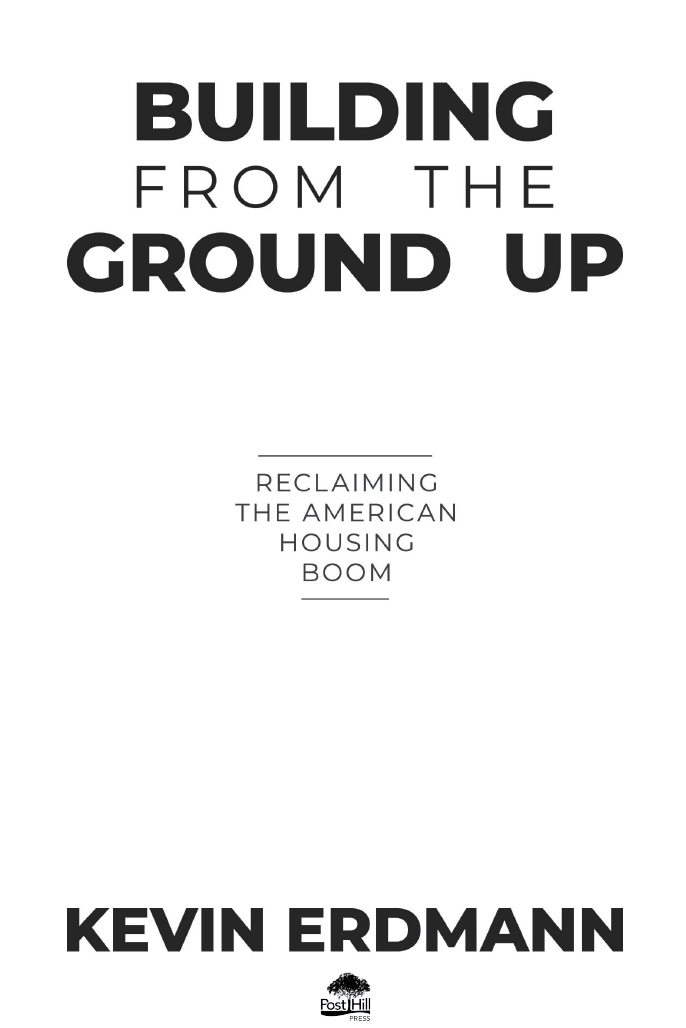
A POST HILL PRESS BOOK
ISBN: 978-1-6 3758-161-2
ISBN (eBook): 978-1-6 3758-162-9
Building from the Ground Up:
Reclaiming the American Ho using Boom
2022 by Kevin Erdmann
All Right s Reserved
Excerpt(s) from STRESS TEST: REFLECTIONS ON FINANCIAL CRISES by Timothy F. Geithner, copyright 2014 by Timothy F. Geithner. Used by permission of Crown Books, an imprint of Random House, a division of Penguin Random House LLC. All rights reserved.
Although every effort has been made to ensure that the personal and professional advice present within this book is useful and appropriate, the author and publisher do not assume and hereby disclaim any liability to any person, business, or organization choosing to employ the guidance offered in this book.
No part of this book may be reproduced, stored in a retrieval system, or transmitted by any means without the written permission of the author and publisher.

Post Hill Press
New York Nashville
posthil lpress.com
Published in the United States of America
Table of Contents
The recovery from the Covid-19 recession may serve as a profound turning point in American economic development. This was a disruption that was thrust upon us. Nobody deserved to get sick. No hotel owner or restauranteur deserved bankruptcy. No maids, waiters, or flight attendants deserved to be unemployed.
This has led to public support for attempts to allay these discomforts. Of course, there are debates about the details. Every policy has tradeoffs, winners, and losers. As we come out of this, we will learn more about whether those tradeoffs were good or bad, on net. There will undoubtedly be some of both. However that falls out, it is clear that forbearance and a pro-growth tilt have become popular in ways they werent during the 2008 recession.
In 2009, CNBCs Rick Santelli was credited with starting the Tea Party Movement from the floor of the Chicago Mercantile Exchange. He fumed, Why dont you put up a website to have people vote on the internet as a referendum to see if we really want to subsidize the losers mortgages? and How many of you people want to pay for your neighbors mortgage that has an extra bathroom and cant pay their bills? Raise their hand.
In 2020, millions of American homeowners were given a chance to miss some mortgage payments to help them get through the pandemic. This has not led to the ad hoc creation of a new political movement.
During the pandemic, much of the financial support has come in the form of subsidies and cash transfers. As we escape the pandemic, prosperity will depend more, again, on Americans helping ourselves, working together, and finding new ways to engage with one another economically.
The US economy has an incredible amount of pent-up potential. I mean this in a real sense. I dont mean that stock prices can go up more or that incomes will rise. Those things can happen. But if they happen, it will be the result of Americans being productive, taking risks, and innovating.
The American economy has become tied up in knots because in many ways we have simply made it illegal towell, to just do stuff. Most people my age likely remember people who, decades ago, might have watched several children at their home, or say, cut hair in a makeshift one-chair salon in their garage so they could earn some cash while staying home with their kids. So much of that type of economic activity has disappeared today because the state requires onerous occupational licensing. Or the state, or city, or homeowners association may forbid some types of home-operated businesses. Or countless other rules meant to make things more orderly.
These sorts of rules usually have pros and cons, but it is possible for the pendulum to swing too far in one direction. In the book Shut Out , I highlighted how entire metropolitan areas have become inaccessible to millions of families by making it very difficult to build new housing. Those difficulties sometimes start with good intentionsmaking sure the local infrastructure can handle more people, making sure displacement of locals is minimized, managing environmental impacts, and keeping units with historical importance. But the tools for applying these sorts of oversight are now routinely abused. For instance, proposed buildings in San Francisco are opposed because they might throw a shadow on a park early in the morning a few days a year. Its going to be very hard for San Francisco to be a world-class center of innovation, and to be affordable, if buildings can be opposed for casting shadows.
These obstructions have made metropolitan success synonymous with high costs. It wasnt always this way. It doesnt have to be this way. One reason nineteenth century and twentieth century America were beacons of hope and prosperity is that people moved to places that offered opportunity. Back then, metropolitan success was synonymous with population growth.
We have created a sort of reverse-flow Oregon Trail of Americans migrating to new places not because of hope for a new life but, instead, because of desperation for an affordable life. Americans frequently move to cities that legally allow more housing rather than to where housing would be more valuable to them.
We have a tremendous amount of potential to heal from the wounds of the pandemic and its recession simply by giving ourselves permission to do stuff again. Specifically, the story I have to tell you is about the economic fetters we have fitted on each other that are associated with the calamities of the Great Recession and the global financial crisis.
By 2005, the country appeared to have been overtaken by a housing bubble. It seemed there was too much money, too much credit, too many speculators, too many bankers, and eventually, too many houses at prices that were too high. Forbearance and a pro-growth tilt certainly wouldnt be prudent ways to handle all of those things. So, policymakers tried to pull back on economic growth and bank credit to kill the bubble. Americans reacted angrily wherever policymakers tried to lessen the pain and bail out various interests. Unlike the pandemic, we seemed to have brought this on ourselves, and we deserved our correctional fate. Or at least somebody did.
Next page
